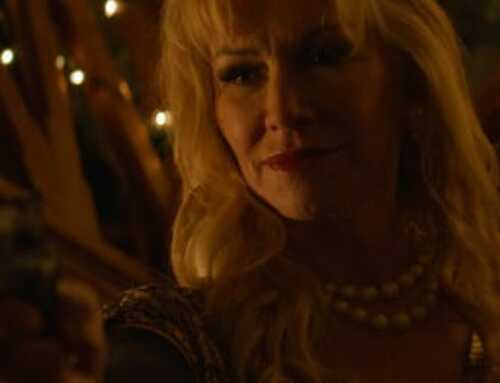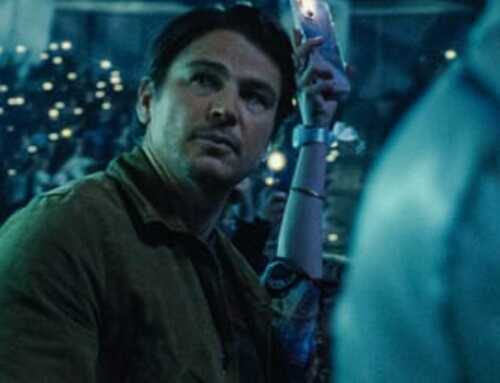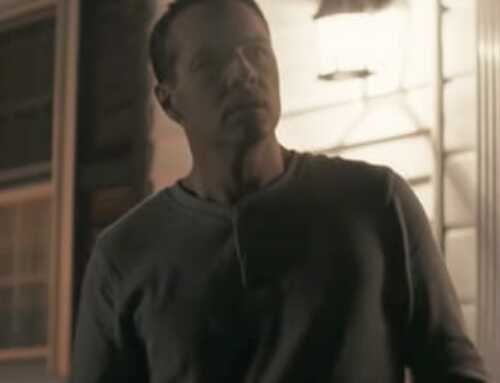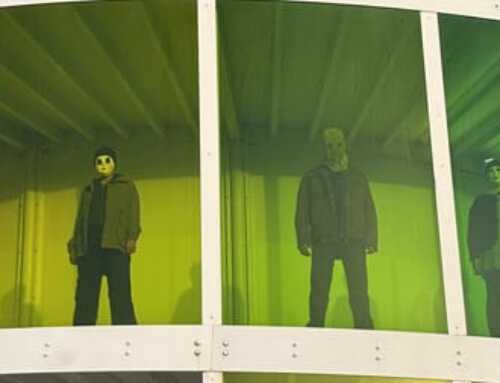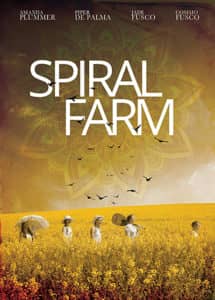 If you haven’t heard, there is a passionate new director out there, named Alec Tibaldi. He sits at the helm of some powerful upcoming female stories. Horrorbuzz had the pleasure of seeing his debut feature-length film, Spiral Farm, earlier this year at LA’s Slamdance, and Tibaldi has since scored distribution for his film thanks to Indican Pictures. We sat down with this up and coming director to pick his brain.
If you haven’t heard, there is a passionate new director out there, named Alec Tibaldi. He sits at the helm of some powerful upcoming female stories. Horrorbuzz had the pleasure of seeing his debut feature-length film, Spiral Farm, earlier this year at LA’s Slamdance, and Tibaldi has since scored distribution for his film thanks to Indican Pictures. We sat down with this up and coming director to pick his brain.
HorrorBuzz: There were a lot of female stories that night [of Slamdance at the Arclight]. I don’t know if you are affiliated with the short that premiered in front of Spiral Farm?
Alec Tibaldi: East of the River? Yea that one was from my friend, Hannah Peterson.
HB: Were you friends beforehand, or did you guys meet during the Slamdance process?
AC: What happened was that Slamdance paired our films together so we screened our movies alongside each other at Park City and then at the Arclight. She works with a filmmaker named Sean Baker whom I’m a really big fan of so we sort of bonded over our shared love of his work. It’s nice when you find someone who is also just trying to come up in the industry and make a film. That’s what’s so nice about that film festival circuit is that you meet filmmakers who are like you and also not like you. As filmmakers we don’t really get to meet each other because on film sets there is only one writer, etc… we don’t really come into contact with other filmmakers.
HB: Ah, I never really thought about that, there being one director on set. You guys don’t really get to hang out and bounce ideas off of each other.
AC: Right we know more sound makers and actors than we do other filmmakers, it’s weird. We don’t really get to be on each other’s sets so it’s nice to be able to meet each other in different contexts.
HB: Would you ever want to have a co-director or you prefer being the one director on set?
AC: I am actually in the process of co-directing a film, which I’m in post-production on, it’s called The Daphne Project, and I co-directed it with my really good friend Zora Iman Crews. We went to high school together and she is a theater actress out of NYC.
HB: Do you have any other projects in the pipeline, any shorts or feature-lengths that you’re thinking of?
AC: So The Daphne Project is a feature-length, we’re wrapping that one up now and hopefully will start doing festivals soon. Then I am writing a couple of other projects that I haven’t quite figured out which one is going next. It’s about the timing, which one has an interest, which one we can get going first. I’m focused on the release of this film [Spiral Farm] and the post-production of my second film, getting those ones out there. I want to do everything at once but sometimes I have to be a little more patient.
HB: I felt like Spiral Farm is a coming of age, more like a drama. Will The Daphne Project be along those lines or is it a different genre that you’re exploring?
AC: It is completely different – it is a mockumentary and a comedy, sort of in the style of the Office or Parks And Rec. It is about a group of actors putting on a production of The Bacchae, a Greek tragedy, and our protagonist comes in and wreaks havoc on the production. A lot of it is Zora wanting to tell her story of being African American in an all-white artistic setting, exploring what her experience is like in the theatre world. We created this piece about a really complicated protagonist and it was a very very different thing from what I had been doing, that’s why I was attracted to it. It was a breath of fresh air and it was really nice to help a friend tell her story while also giving my filmmaking input on it. It was very rewarding, a lot of work, and a crazy shoot, but the story felt like something that we really needed to tell and there were issues that we felt really needed to be talked about. We got to do it in sort of a fun and funny way. We really had a blast.
HB: I stumbled upon your Vimeo page and there were some past projects that looked female lead, and then Spiral Farm is a female-centered story. What would you say attracts you to telling female stories?
AC: I think they’re just stories with compelling protagonists, it’s definitely not a conscious thing that I set out to tell a specific gender’s story. It does happen that my first two features have both been exploring what a woman’s experience is, and I guess for me it’s definitely the character that comes first. I think there are a lot of male directors who like to do that, like Lars Von Trier has written very interesting female characters. I think what’s so great about film, you can explore the gender of someone else and it’s kind of fluid. I wouldn’t want to pigeon hole, like only this type of person puts out this type of story — it is freeing to tell a story about a gender or experience that is not exactly yours.
HB: I think Pedro Almodóvar is along those same lines in his interviews, many of his stories being female-centered because he finds them more lively and interesting and they’re allowed to express a greater range of emotion.
AC: I definitely feel that I’m interested in protagonists who can share their full range of emotions and in this society, I feel female characters are usually allowed to do that more. I love movies about men but it is something about a well written female character. Maybe my third film will be just all about men and toxic masculinity!
HB: Go for it, there’s an audience for everything! So I am wondering about the commune setting. Have you always had an interest in communes, or you just thought that would be an interesting setting to tell a story in?
AC: I did a little bit of research spending some time at a commune here in Southern California. I’ve always been attracted to that way of living, there’s something enticing about it and I have a lot of respect for people to live that way. I had the story in my mind but I couldn’t find the right place, for me, place and setting are so essential for me to write something. I couldn‘t really write it until I had seen where it was going to be. I and my co-story writer spent some time talking to people and within an hour I knew this was the place I had wanted to tell the story. The way I grew up was in a big city and it’s completely opposite to this environment of nature and trees. I grew up in a giant apartment building with no relation to the sky, no relation to nature, so I was very attracted to it just because it was so different from anything I had ever experienced.
HB: With this being your first feature-length film, what were some tribulations and setbacks that you experienced? And what were some highlights?
AC: This one was tough. When you’ve never done it before you don’t really know how hard it is going to be. When I started I kind of had no idea what I was getting myself into and it was a rollercoaster. We would raise money and it would fall through, we would cast an actor and they would drop out, we would get a producer and they would drop out, it was a lot of delays it was a lot of almost starting and then not starting. It was a very challenging pre-production. And then production was fairly smooth. We had phenomenal actors, we always had great days with a great cast and crew. When we got into it was like a camp experience where all of our friends were together on this ranch in Altadena making a movie together and it was this very DIY magical thing that we did together. So it was high highs and low lows, and now that I know, I take all of those lessons from the first one into my next one.
HB: How are your experiences with Spiral Farm going to inform your next projects?
AC: The biggest thing I have learned is that you don’t really need the things that you think you would need. People will tell you that you need to have this and that and a certain number of people on set, and there’s all these sorts of rules, but once you figure out the way that you work, you augment those to your own self. There’s not one way to make a film, a film is so malleable. It’s very specific to who you are, and as the person in charge, you kind of have a lot of say in how the set gets run and it was a huge learning experience for me.
HB: Did you have any mantras to get you through the process?
AC: I would say ‘be cool like a Copolla’. I’ve seen interviews with the Copollas and they’re so relaxed. So don’t get stressed, don’t get anxious, take deep breaths, they’re so mellow and I love them all. They’re like the most chill film family.
HB: I can relate to that, I get anxious. You should put that mantra on a shirt!
AC: Right, be cool like a Copolla. And also they’re just so cool I just want to hang out with them and just bask in their film and win and Italianness. I’m a fan of their clan.
HB: You and Piper were friends beforehand, where did you guys meet and do you feel the filming process changed your relationship?
AC: I had just moved to LA and was looking to cast my first short, Ride or Die, and I had asked my friend who the best actress in the school was and she said ‘oh it’s my friend Piper you guys have to meet’. We met and she was amazing and we made two short films together while she was still in high school, eventually, we decided to make this feature together. I just spoke to her on the phone for an hour, we’re still friends. She was in The Daphne Project as well so we’re continuing to make films together. I think filming has brought us closer together, we’ve had such amazing experiences like being on the ranch being in Park City for premiere going to Europe for the Italian film festival premiere. We got to make this movie and together show the film to audiences in all these exciting places, it’s honestly been an incredible journey to take as a creative team.
HB: So where can people find Spiral Farm next?
AC: Spiral Farm is coming out in theaters December 13th in LA, San Francisco, and Chicago, and then we will be released to digital platforms and DVD on December 17th. I’m so excited we can have both theatrical and VOD…as a filmmaker I love going to the movies, and though this film is small it really was meant to be seen that way. I’m just so thankful that Indican [Indican Pictures] believes in the film enough to give it a theatrical release, it’s getting rarer and rarer for indie films to get that nowadays. There are a lot of films that are released straight to VOD, especially smaller films. Before Indican stepped up we weren’t sure, so I’m really grateful to them believing it can find an audience that way.
It was great sitting down with this personable and relatably director, out here telling stories that were hitherto niche ventures. With the help of Indican, a distribution company that specializes in bringing indie films to wider audiences, Spiral Farm is finding new life and an opportunity to capture moviegoers into its communal world. With powerful female performances from Piper De Palma, Amanda Palmer, and Jade Fusco, Spiral Farm and its director, Alec Tibaldi, are deserving of its upcoming releases. You can follow Alec Tibaldi on – Instagram | Twitter and his film Spiral Farm on Instagram | Facebook.


